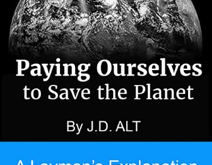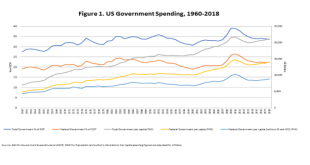By J.D. ALT The last two and a half months I’ve been at work on a new book. As it evolved, I found I was approaching MMT from a new direction—one which made an explanation of MMT much less counter-intuitive and, perhaps, less controversial. The approach is relatively simple and straight-forward: follow what I began calling “standard money theory” step by step until one reaches a perspective that has, almost seamlessly, become “modern money theory.” The book first considers why the...
Read More »STANDARD MONEY THEORY
By J.D. ALT The last two and a half months I’ve been at work on a new book. As it evolved, I found I was approaching MMT from a new direction—one which made an explanation of MMT much less counter-intuitive and, perhaps, less controversial. The approach is relatively simple and straight-forward: follow what I began calling “standard money theory” step by step until one reaches a perspective that has, almost seamlessly, become “modern money theory.” The book first considers why the...
Read More »MMT is a Political Problem: Part 2
Thornton Parker In the first part of this series, we explained why MMT should be seen as a political problem rather than just an educational one. In this concluding part, we will discuss where MMT promotion is most likely to fail or have good chances of success. First, consider some poor prospects. All readers of NEP know how Social Security works and it seems like a natural for MMT. But is it? Wall Street sees the program as a leak from what should be their profitable...
Read More »MMT is a Political Problem: Part 2
Thornton Parker In the first part of this series, we explained why MMT should be seen as a political problem rather than just an educational one. In this concluding part, we will discuss where MMT promotion is most likely to fail or have good chances of success. First, consider some poor prospects. All readers of NEP know how Social Security works and it seems like a natural for MMT. But is it? Wall Street sees the program as a leak from what should be their profitable...
Read More »MMT is a Political Problem: Part 2
Thornton Parker In the first part of this series, we explained why MMT should be seen as a political problem rather than just an educational one. In this concluding part, we will discuss where MMT promotion is most likely to fail or have good chances of success. First, consider some poor prospects. All readers of NEP know how Social Security works and it seems like a natural for MMT. But is it? Wall Street sees the program as a leak from what should be their profitable...
Read More »MMT is a Political Problem: Part 1
By Thornton Parker The way a problem is seen can determine how or even if it gets solved. When the French engineer, Ferdinand de Lesseps, was picked to build the Panama Canal, he saw it as another excavation problem as his Suez Canal had been. But Egypt was flat and Panama had a mountain. When the United States took over the job, John Stevens, who was put in charge, saw it as a railroad problem. The biggest task was to move ninety-six million cubic yards of rock and earth, as...
Read More »MMT is a Political Problem: Part 1
By Thornton Parker The way a problem is seen can determine how or even if it gets solved. When the French engineer, Ferdinand de Lesseps, was picked to build the Panama Canal, he saw it as another excavation problem as his Suez Canal had been. But Egypt was flat and Panama had a mountain. When the United States took over the job, John Stevens, who was put in charge, saw it as a railroad problem. The biggest task was to move ninety-six million cubic yards of rock and earth, as...
Read More »MMT is a Political Problem: Part 1
By Thornton Parker The way a problem is seen can determine how or even if it gets solved. When the French engineer, Ferdinand de Lesseps, was picked to build the Panama Canal, he saw it as another excavation problem as his Suez Canal had been. But Egypt was flat and Panama had a mountain. When the United States took over the job, John Stevens, who was put in charge, saw it as a railroad problem. The biggest task was to move ninety-six million cubic yards of rock and earth, as...
Read More »STATEMENT: House Budget Committee, “Reexamining the economic costs of debt”, Nov 20, 2019
By L. Randall Wray This blog is based on the testimony I provided to the US House of Representatives. My written statement will be published in the Congressional Record (a version is also at the Levy Economics Institute: http://www.levyinstitute.org/publications/statement-of-senior-scholar-l-randall-wray-to-the-house-budget-committee. The full statement was co-authored with Yeva Nersisyan. I will argue that the Federal Government’s deficit and debt are not so scary as we are led to...
Read More »STATEMENT: House Budget Committee, “Reexamining the economic costs of debt”, Nov 20, 2019
By L. Randall Wray This blog is based on the testimony I provided to the US House of Representatives. My written statement will be published in the Congressional Record (a version is also at the Levy Economics Institute: http://www.levyinstitute.org/publications/statement-of-senior-scholar-l-randall-wray-to-the-house-budget-committee. The full statement was co-authored with Yeva Nersisyan. I will argue that the Federal Government’s deficit and debt are not so scary as we are led to...
Read More » Heterodox
Heterodox




